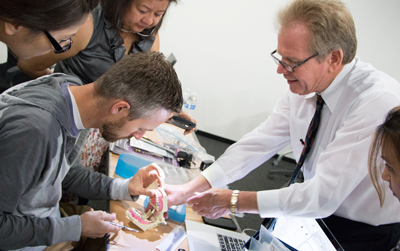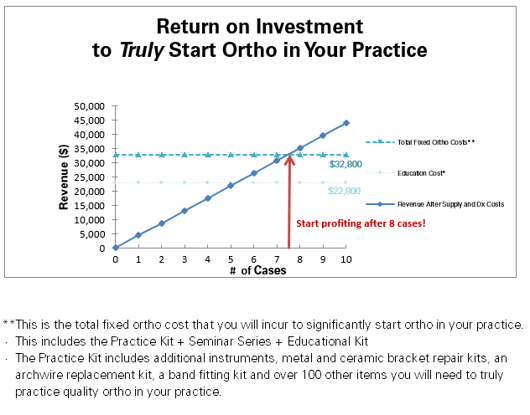As a general dentist, you may have considered adding orthodontic treatment to your practice at some point in your career. You may have spoken with sales reps from different education and supply companies who explained to you the amazing benefits of GP orthodontics. While it is great to know how orthodontics would improve your practice, you were likely left thinking of the challenges that ortho would present.
Considering the challenges of GP orthodontics before jumping in is very responsible, and can help prevent unexpected problems that you don’t have the tools to solve. To help you get a clear understanding of how orthodontics will affect your practice, we’ve detailed out both the advantages AND challenges of 4 important points to consider before you decide to practice GP orthodontics.
Advantage
Any dentist can do it
Challenge
Time commitment
Regardless of what you were told in dental school, any dentist can do quality orthodontics. With new advances over the past two decades, GPs can “easily” provide a high level of care. Diagnostic software and smarter appliances have eliminated the need for exceptional hand-skill and memory that was vital for orthodontic success in the past.

Many doctors find that learning orthodontics is not as difficult as making the time commitment required to study it properly. Finding the time to study can be difficult when you’re running your own practice. Although there are programs that have flexible learning options, the time commitment is often the largest challenge that most dentists have.
We caution you from being tempted with “shortcuts” as we’ve seen dentists get into trouble this way. Although any dentist is capable of doing great orthodontic work, he/she needs to understand diagnosis and treatment planning well to do so, and this knowledge cannot be obtained in just a few weekend courses. From the thousands of dentists we’ve met throughout the world, we’ve concluded that any dentist can learn to do great ortho with the right training and support.
2. Liability
Advantage
Low risk
Challenge
Tied to the case
In orthodontics, you can easily avoid legal (and clinical) trouble by taking proper records, documenting fully, and planning treatments diligently for every case. Orthodontics is generally a low risk service because the treatment is relatively noninvasive and its long duration allows you correct most mistakes quite easily. For example, if you place a bracket too incisal or gingival (or even upside down!), you can easily rebond it at the next appointment and the teeth will level out nicely without delay in treatment.

The long treatment duration of orthodontics, however, means that you are often tied to your patients for a couple of years. You thus must be prepared for the choices and changes in your patients’ lives. You should expect to have occasional issues with patient compliance when wearing rubber bands or headgear, or not flossing. Luckily, modern orthodontics gives dentists more tools (like coils, pins, and plates) to avoid many of the non-compliance issues of the past.
3. Financial Investment
Advantage
Very profitable
Challenge
Startup costs
When orthodontics is set up right it is highly profitable, and this can be especially true for GP practices. With little to no new marketing costs, minimal supply expenses, and your assistants doing most of the chairside work, orthodontics can be a significant profit center. If you typically refer out 20 cases a year, that's around $100,000 in revenue that could have gone to your practice.
Some doctors are concerned about the startup costs when they first begin orthodontics, and they should definitely prepare their budgets before starting. There are several things that you’d want to invest in when starting, including some inventory like adhesives, instruments, ligature wire, and items to take records etc. (See 8 ortho supplies you absolutely need to start cases). Luckily, most supplies needed for orthodontics are inexpensive and no large machines are required, although you might consider investing in a ceph machine to make it easier for patients. We normally see doctors spending $18,000-$34,000 in inventory and education costs in their first two years.

Fortunately, many ortho expenses (like customized bands, brackets, and wires) can be incurred after the patient has accepted treatment, or incurred gradually (like for training), so you can still profit early on. Please keep in mind that the most expensive part of orthodontics will be your time. So before you start ortho, think about the potential income lost on days spent away learning. Many doctors find it difficult to be away from their practice, but remember that thoroughly understanding orthodontics will maximize your efficiency and profitability.
With these direct startup costs, you will need to complete several cases before you start seeing a return on your investment, but once you have a well-established ortho service you can expect to earn back your money several times over.
4. Career Opportunity
Advantage
Transformational
Challenge
May not want to do General anymore
Orthodontics is a great career addition for most dentists as it’s rewarding, sustainable, and makes every aspect of dentistry better. Patients (and their parents) are usually aware when they have “crooked” teeth and desire to have them corrected. Orthodontics can have such a dramatic effect on a patient’s appearance, and they appreciate the service (usually more than a root canal). When patients begin taking pride in their smile, it becomes very apparent to those around them, and often brings you referrals (read the stories of 3 ortho patients).

Orthodontics has less strain on your body than general dentistry and can be helpful for those who have back and hand issues. Moreover, orthodontics’ ability to help you fix and understand occlusion will make every aspect of your dental practice better.
We’ve seen some doctors love doing orthodontics so much that they decide to hire an associate to do the general dentistry. While this may be a good problem to have, it’s a consideration to think about.
Orthodontic treatment won't always be a walk in the park, but the satisfaction of helping your patients smile confidently coupled with the financial benefits for your practice can boost your career in a way that no other specialty can.
If you want to learn more about how orthodontics may fit in your practice, start today with this free virtual Intro to Ortho class! Watch to learn basic orthodontic principles and see some sample cases (and earn 8 CE).
Need more information to decide if orthodontics is right for your practice? Schedule a free consultation to discuss your specific practice goals and concerns with an expert. Our advisors are available to speak with you Monday-Friday from 6:00AM to 5:30PM PST, so tell us more about your practice and we'll give you a call!


